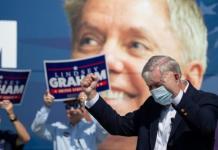The Gerrit Cole free agent tour took the tone of a fabricated monster whose creators were irrationally convinced they could control it only to see it grow in strength and power, ignoring its prime directive and becoming self-aware, destroying everything in its path.
It sounds like the plot of a terrible movie. Or a good movie. Or somewhere in between.
That monster is set to take its talents to New York with the news breaking late Tuesday that the New York Yankees signed Cole to a 9-year, $324 million contract. They essentially saved themselves from the aforementioned film treatment expanding to George Steinbrenner rising from the grave to unleash untold terror on his sons and Brian Cashman.
With every free agent, there are rumors and reality. Cole’s foray onto the market was exponentially worse in part because he was the biggest name out there and is at the top of his game. But, also because several teams have abandoned the pseudo-collusion that has negatively impacted free agency and sown discord among the players and agents with concerns that baseball front offices have formulated a strategy to collude. Albeit, without being as clumsy and arrogant as the owners were in the mid-1980s which led to lawsuits and massive settlements.
The objectivity of statistics are the collusive aspects and they’re difficult to dispute. Since every team is essentially using the same tactics to craft their rosters, there is a value they place on a player and refuse to go beyond it. That might have kept Cole’s number reasonable had he been a free agent one year ago. Not anymore.
There has been a paradigm shift for several teams just as Cole hit free agency. Two prime examples are the Philadelphia Phillies and the Los Angeles Angels of Anaheim. Both clubs moved away from the adherence to the numbers and sticking to a blueprint with unquestioning trust on the baseball people and their analytics departments. Both situations changed when ownership said enough was enough and became heavily involved.
The Phillies essentially usurped the power of general manager Matt Klentak by firing his handpicked manager, Gabe Kapler, with whom he was on the same identical page. Then hiring the older school Joe Girardi who, it could be argued, has essentially become the de facto GM with the ear of principal owner John Middleton. The signings of Zack Wheeler and Didi Gregorius so far practically prove it.
The Angels have floundered as GM Billy Eppler sought to rebuild the dilapidated farm system. Tired of accepting mediocrity and wasting Mike Trout’s prime years, owner Arte Moreno clearly took control with the firing of manager Brad Ausmus and the hiring of former Angels coach and interim manager Joe Maddon. Hiring Maddon comes with the obvious promise to give him a team he can win with. That means spending. And it meant pursuing the best arm on the market: Cole.
Throughout the process, the Yankees were perceived as creeping back to the past as well with it uncertain how deeply they were willing to dig into the vault. The club had taken major steps to abandon the Steinbrenner patriarch’s model of having a star-studded cast fit for a Broadway extravaganza. Sure, they still spend, but it’s judicious spending and the Steinbrenner sons must be convinced to go beyond their preferred spending limits and the dreaded luxury tax thresholds.
Shunning the likes of Bryce Harper, the Yankees’ roster was largely homegrown with signings and trades who fit in rather than brought the star with them as Reggie Jackson did. Regular season success aside, 100+ wins in back to back years is not good enough in the Bronx if the team loses in the playoffs. Having fallen short in their attempts to win the organization’s 28th World Series title in a drought that is now a decade long, they were reportedly all-in on Cole.
Revered baseball writer and insider emeritus Peter Gammons was the most overt regarding his belief that Cole will – not might, will – end up with the Yankees.
Gerrit Cole will go into New York for his age 29 season, and in 2018 averaged 102 pitches in 33 starts, didn’t get to 100 in a third of them, got the ‘Stros to the 7th 29 times, did not go past 113 Ps until his high of 118 in Game 1 vs. Tampa.
— Peter Gammons (@pgammo) December 7, 2019
Other reporters and bloggers were more circumspect, but still braved the toxic depths of the Hudson River to seek nuggets to suggest Cole would shun his Southern California roots and perceived preference to go back to the West Coast and sign with the Yankees.
Would Cole go to the Yankees? The Angels? The Dodgers? The ever-elusive and predictable “mystery team” that Jon Heyman brought up on Tuesday?
The answer was what the answer always is: follow the money.
The stars certainly aligned for Cole and agent Scott Boras to secure that record-shattering contract. Much of that was due to another Boras client, Stephen Strasburg. Strasburg re-signed with the Washington Nationals with a 7-year, $245 million contract. The financial parameters for Cole – two years younger and better than Strasburg – were cemented there and then.
Cole having been traded from the Pittsburgh Pirates to the Houston Astros multiplied his price as he evolved from a struggling but gifted hurler into one of the top three pitchers in baseball and a strikeout machine. Had he been traded anywhere else, it’s difficult to envision him having improved so markedly.
Desperation and ownership involvement with the big money teams like the Angels gave him a fallback that might not have existed a year or two ago when club owners were following the plan with financial sanity for the greater good. That the Yankees, Angels and possibly the Dodgers are three of the most well-heeled clubs in baseball and were willing to spend that money gave Cole three known suitors to play against each other.
Boras could do the rest with implications that there were other teams – secret teams – who were set to jump in. He could tell the Yankees that his client was willing to go to the East Coast, cut his hair, shave his beard and fall in line…if their offer is worth his while.
If the Yankees were under the impression they would get Cole for the rumored $245 million that was said to be their initial offer, any limit on Cole’s financial goals were detonated when Strasburg signed. If Cole was thinking $300 million, that rose to $324 million plus incentives. And he got it.
That’s the market. Cole didn’t set it, but he took advantage of it. Circumstances and fortuitous timing helped him do it.





